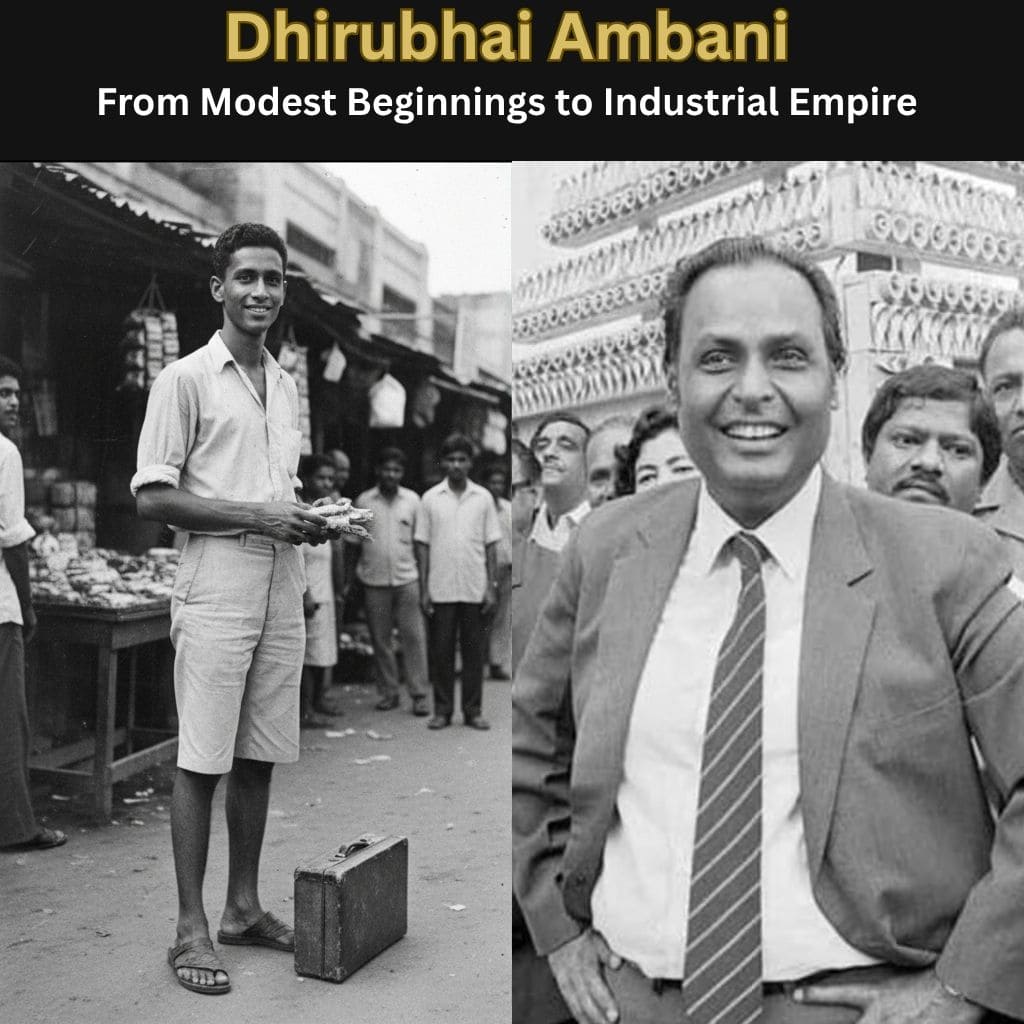Dhirubhai Ambani – From Modest Beginnings to Industrial Empire
By: Compiled from various sources | Published on Oct 16,2025
Category Moral Stories

You know, when people talk about rags-to-riches stories, Dhirubhai Ambani's name always comes up. And honestly? It's deserved. This wasn't some overnight success story or lucky break—it was decades of grit, smart thinking, and refusing to give up when things got tough.
The Beginning
Dhirubhai (his full name was Dhirajlal Hirachand Ambani) was born in 1932 in a tiny village called Chorwad in Gujarat. His family didn't have much. Money was tight, and luxuries were out of the question. At just 16, he dropped out of school and headed to Aden—that's in Yemen now—to work as a clerk at some trading company.
Now, most teenagers would've been lost in a foreign country doing paperwork all day. But Dhirubhai? He soaked it all in. He watched how businesses worked, how deals got made, how money moved around. Those years taught him things no classroom ever could.
Coming Home with a Dream
Fast forward to 1958. He's back in India, and he's got this burning desire to build something of his own. So he starts small—really small—with a textile trading business. Not much capital, not many connections, just pure hustle and a sharp mind for spotting opportunities.
By 1966, he'd launched his first textile mill and created the "Vimal" brand. What made him different was how he thought about the whole picture. It wasn't just about making good fabric; it was about getting it everywhere, building a network so strong that Vimal became a household name.
The Tough Parts No One Talks About
Look, it wasn't all smooth sailing. Far from it. Dhirubhai ran into walls constantly—competitors trying to shut him down, government red tape that would make anyone want to quit, money problems that kept him up at night.
But here's where he really showed his genius: when traditional banks wouldn't back him enough, he turned to the stock market. This was revolutionary back then. He essentially said, "Why not let regular people invest in my dream?" And it worked. Small investors believed in him, and he never forgot that trust.
Building Something Bigger
Over the years, Reliance grew into this massive conglomerate—petrochemicals, energy, telecom, retail, you name it. Here's what got me about Dhirubhai though. Sure, the guy wanted to make money—who doesn't? But you could tell it went deeper than that. He had this thing about proving India could compete with anyone. He wanted to build factories that gave people real work, not just talk about it. And maybe it sounds cheesy, but I think he actually got a kick out of showing Western companies that Indian businesses could beat them at their own game.
His management style was interesting too. He pushed people hard, sure, but he also trusted them. He'd spot talent and give them room to run with ideas. That's rare—most founders can't let go of control like that.
What We Can Learn
Dhirubhai died in 2002, but his legacy lives on through his sons Mukesh and Anil, who've taken Reliance in their own directions. When I think about what his story really teaches us, a few things stand out:
Starting small doesn't mean thinking small. He began with almost nothing but always had that bigger vision in his head.
Problems aren't roadblocks—they're just puzzles to solve. Every time something went wrong, he found a workaround.
People matter. Whether it was his investors, his employees, or his customers, he understood that business is ultimately about relationships.
Calculated risks beat playing it safe. He took chances that made others nervous, but they were never reckless. He'd done his homework.
Hard work isn't optional. There's no substitute for putting in the hours and doing the grunt work, especially in the beginning.
Why This Still Matters
I think Dhirubhai's story resonates because it feels real. He wasn't born into privilege. He didn't have an Ivy League education or rich family connections. What he had was pure stubbornness, honestly. Street smarts? Yeah, tons of it. But more than anything, he just refused to believe he couldn't pull it off. That kind of confidence—or maybe delusion, depending on how you look at it—can take you pretty far.
For anyone out there trying to build something—whether it's a startup, a career, or just a better life—his journey is proof that where you start doesn't determine where you finish. It's about showing up even when you don't feel like it, screwing up and figuring out what went wrong, and remembering why you started this whole thing in the first place.
That's the real lesson. Not some fancy business strategy, but the simple truth that persistence, creativity, and integrity can take you further than you ever imagined.
Amazon Affiliate Disclosure
As an Amazon Associate I earn from qualifying purchases.
Comments
pramodchaudhary2006
November 27,2025
Very good
pramodchaudhary2006
November 27,2025
Nice 👍
nisar1991ahmed
December 02,2025
Good

.png)
.png)
